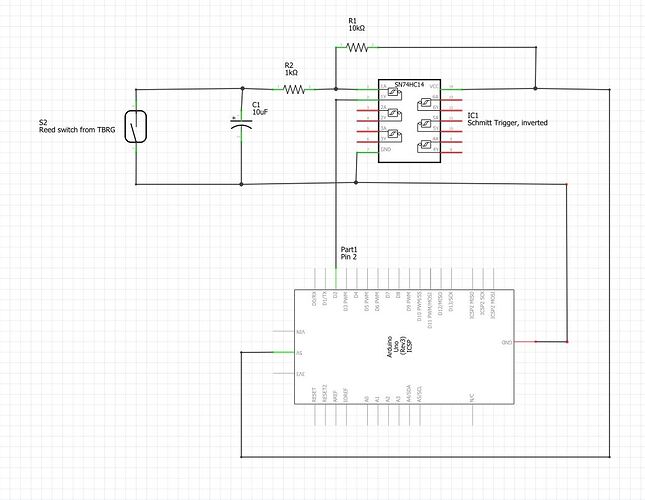Dear enthusiasts,
Currently I'm interfacing a Tipping Bucket Rain Gauge (TBRG) to an Arduino Uno.
The TBRG, when it tips, swings a magnet in front of a reed switch which then momentarily closes and pulls the line LOW.
I am using a traditional de-bouncing circuit that is attached to a 74HC14 (Inverted Schmitt Trigger). The output of the 74HC14, which is inverted, is connected to pin 2 of the UNO. This pin is monitored by an interrupt which starts the TBRG function. Every tip detected is then added to the counter which is then transmitted to home base via an nRF24L01.
The de-bouncing circuit has a capacitor of 10 uF and a resistor of 1 kiloOhm. This should give me a R/C time delay of 10 milliseconds. The interrupt also creates a 100 milliseconds delay. The TBRG tips at a maximum rate of 1 Hz, so, plenty of time between tips.
So basically I've got a hardware de-bounce circuit and a software de-bounce routine.
The problem:
This system runs like a dream. However, now and then and without any changes, the output of the Schmitt Trigger stays HIGH all the time! I have tried removing the capacitor, as I thought it stayed saturated when switching too fast, but to no avail.
I have attached my schematic of the circuit to this posting.
Here is my code:
/* nRF24L01 Transmitter code, 20-03-2018
Set up nRF24L01 radio on SPI bus (pins 10, 11, 12, 13) plus pins 7 & 8
Connections for UNO: GND= GND, VCC= +3.3V, CE= pin7, CSN= pin8, MOSI= pin11, MISO= pin12, SCK= pin13, IRQ= not used
Connections for MEGA2560: GND= GND, VCC= +3.3V, CE= pin7, CSN= pin8, MISO= pin50, MOSI= pin51, SCK= pin52, IRQ= not used
Date and time functions using DS3231 RTC connected via I2C and Wire lib
To set time see other sketch "DS3231_Adjust_date_and_time" in same folder*/
#include <SPI.h> //For nRF24L01
#include <RF24.h> //For nRF24L01
#include <Wire.h> //For RTC
#include <Sodaq_DS3231.h> //For RTC
//LOOP time delay variables
unsigned int PreviousMillis = 0;
const int Interval = 1000; //Create delay of 1 second for main program to run
//TBRG variables
const int TbrgPin = 2; //TBRG connected to pin 2
byte TbrgTip;
volatile int AccVal = 0; //Accumulated tips as measured by TBRG
//DS3132 variables
char TimeBuffer[20] = "";
byte LastDay;
//LDR variables
int LDRvalue;
//nRF24L01 variables
RF24 radio(9, 10); // CE, CSN
byte addresses[][6] = {"0"}; //Identify the transmitting and receiving bit
/*TBRG INTERRUPT ROUTINE*/
void isr () {
static unsigned int LastInterruptTime = 0;
unsigned int InterruptTime = millis();
if (InterruptTime - LastInterruptTime > 100) {
if (digitalRead(TbrgPin) == HIGH){
AccVal++ ;}
LastInterruptTime = InterruptTime;}
}
//XXXXXXXXXXXXXXXXXXXXXXXXXXXXXXXXXXXXXXXXXXXXXXXXXXXXXXXXXXXXXXXXXXXXXXXXXXXXXXXXXXXXXXXXXXXXXXXXXXXXXXXXXXXXXXXXXXXXXXXXXXXXXXXXXXXXXXXXXXXXXXXXXXXXXXXXXXXXXXX
void setup() {
Serial.begin(9600);
pinMode(TbrgPin, INPUT);
attachInterrupt(digitalPinToInterrupt(TbrgPin), isr, HIGH);
Serial.println("THIS IS THE TRANSMITTER CODE");
rtc.begin(); // Start the RTC library code
radio.begin(); // Initiate the radio object
radio.setChannel(124); // 0 to 124, frequencies between 2.4 and 2.5 Ghz in chunks of 100 MHz. Use a channel unlikely to be used by Wifi, Microwave ovens etc
radio.setPALevel(RF24_PA_MIN); // Set the transmit power to lowest available to prevent power supply related issues, can also be set to MAX
radio.setDataRate(RF24_2MBPS); // Set the speed of the transmission to the quickest available, can be set to 250KB or 1MBPS to increase range
radio.openWritingPipe(addresses[0]); // Open a writing and reading pipe on each radio, with opposite addresses
radio.openReadingPipe(1, addresses[0]);
}
//XXXXXXXXXXXXXXXXXXXXXXXXXXXXXXXXXXXXXXXXXXXXXXXXXXXXXXXXXXXXXXXXXXXXXXXXXXXXXXXXXXXXXXXXXXXXXXXXXXXXXXXXXXXXXXXXXXXXXXXXXXXXXXXXXXXXXXXXXXXXXXXXXXXXXXXXXXXXXXX
void loop() {
unsigned int CurrentMillis = millis();
if(CurrentMillis - PreviousMillis >= Interval) {
Clock();
LDR();
TBRG();
Radio(); // TX data
SerMon(); //Display on serial monitor
PreviousMillis = CurrentMillis;}
}
//XXXXXXXXXXXXXXXXXXXXXXXXXXXXXXXXXXXXXXXXXXXXXXXXXXXXXXXXXXXXXXXXXXXXXXXXXXXXXXXXXXXXXXXXXXXXXXXXXXXXXXXXXXXXXXXXXXXXXXXXXXXXXXXXXXXXXXXXXXXXXXXXXXXXXXXXXXXXXXX
void LDR() {
LDRvalue = analogRead(A0);
}
//XXXXXXXXXXXXXXXXXXXXXXXXXXXXXXXXXXXXXXXXXXXXXXXXXXXXXXXXXXXXXXXXXXXXXXXXXXXXXXXXXXXXXXXXXXXXXXXXXXXXXXXXXXXXXXXXXXXXXXXXXXXXXXXXXXXXXXXXXXXXXXXXXXXXXXXXXXXXXXX
void Radio() {
radio.write(&LDRvalue, 4); // Second parameter specifies amount of bytes, float = 4 bytes
radio.write(&TimeBuffer, 20);
radio.write(&TbrgTip, 2);
}
//XXXXXXXXXXXXXXXXXXXXXXXXXXXXXXXXXXXXXXXXXXXXXXXXXXXXXXXXXXXXXXXXXXXXXXXXXXXXXXXXXXXXXXXXXXXXXXXXXXXXXXXXXXXXXXXXXXXXXXXXXXXXXXXXXXXXXXXXXXXXXXXXXXXXXXXXXXXXXXX
void SerMon() {
Serial.print("TX at "); Serial.print(TimeBuffer); Serial.print(" the LDR value = "); Serial.println(LDRvalue);
Serial.print("TBRG accumulated value for current day= "); Serial.println(TbrgTip);
}
//XXXXXXXXXXXXXXXXXXXXXXXXXXXXXXXXXXXXXXXXXXXXXXXXXXXXXXXXXXXXXXXXXXXXXXXXXXXXXXXXXXXXXXXXXXXXXXXXXXXXXXXXXXXXXXXXXXXXXXXXXXXXXXXXXXXXXXXXXXXXXXXXXXXXXXXXXXXXXXX
void Clock() {
DateTime now = rtc.now(); //Read the current date-time from the RTC
sprintf(TimeBuffer, "%04d-%02d-%02d %02d:%02d:%02d", now.year(), now.month(), now.date(), now.hour(), now.minute(), now.second());
if (now.date() != LastDay){ // If read date is not equal to current date than write total value to EEPROM and reset the TBRG tips to 0
//Add code here to write to EEPROM
AccVal = 0;} // Reset AccVal to zero at midnight
LastDay = now.date();
}
//XXXXXXXXXXXXXXXXXXXXXXXXXXXXXXXXXXXXXXXXXXXXXXXXXXXXXXXXXXXXXXXXXXXXXXXXXXXXXXXXXXXXXXXXXXXXXXXXXXXXXXXXXXXXXXXXXXXXXXXXXXXXXXXXXXXXXXXXXXXXXXXXXXXXXXXXXXXXXXX
void TBRG() {
if (AccVal != TbrgTip) {
Serial.println("xxxxxxxxxxxxx");
Serial.print("TBRG tips = "); Serial.println(AccVal);
Serial.println("xxxxxxxxxxxxx");
TbrgTip = AccVal;}
//Write tip event to EEPROM including timestamp
}
//XXXXXXXXXXXXXXXXXXXXXXXXXXXXXXXXXXXXXXXXXXXXXXXXXXXXXXXXXXXXXXXXXXXXXXXXXXXXXXXXXXXXXXXXXXXXXXXXXXXXXXXXXXXXXXXXXXXXXXXXXXXXXXXXXXXXXXXXXXXXXXXXXXXXXXXXXXXXXXX
Any ideas what could be causing this problem? As it is for a TBRG feeding into a weather station I want it to be reliable.
Many thanks in advance.
Cheers,
Luc

